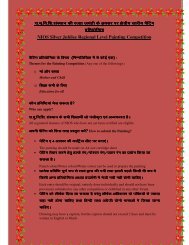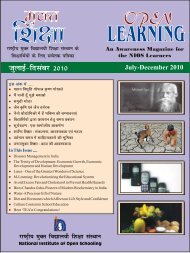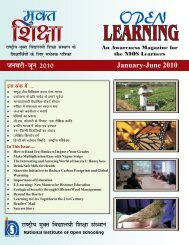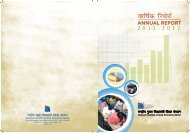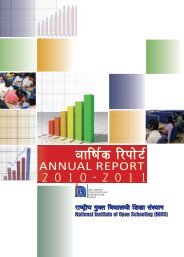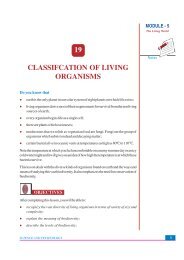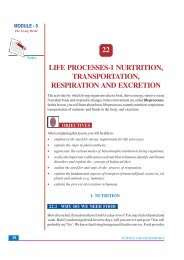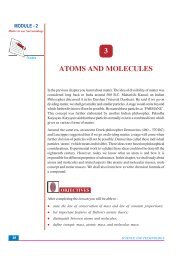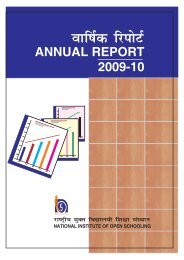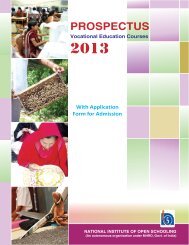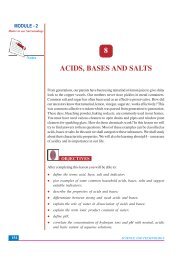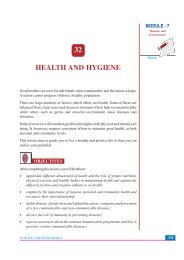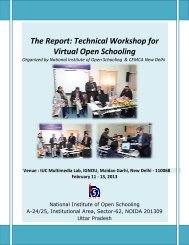Conference Report - The National Institute of Open Schooling
Conference Report - The National Institute of Open Schooling
Conference Report - The National Institute of Open Schooling
Create successful ePaper yourself
Turn your PDF publications into a flip-book with our unique Google optimized e-Paper software.
Ms. Belinda Smith, Consultant, TVET from Australia spoke<br />
upon “Integrating Work experience in TVET in<br />
Schools”. She said TVET is a valuable and viable option<br />
and it’s not for dropouts. Children have different ways <strong>of</strong><br />
learning and some may respond better to TVET stream.<br />
Sharing her experience about TVET in schools, she<br />
emphasized that:<br />
➦<br />
➦<br />
➦<br />
technical content should be incorporated into curriculum<br />
partnerships with other organizations may have<br />
significant benefits<br />
a shift to TVET in school can have major resource<br />
implication.<br />
About various partnership models she named: employers<br />
prefer good general education combined with TVET, school<br />
and college/polytechnic arrangements, industry body<br />
coordination, teacher training, local employers – work<br />
experience.<br />
She said that students should be prepared in schools for<br />
knowledge <strong>of</strong> what work is like, knowledge <strong>of</strong> what the job<br />
consists <strong>of</strong>, knowledge <strong>of</strong> ‘what they are in for’, what will<br />
be required from the employer, working in groups and teams,<br />
independence and responsibility; and confidence in doing<br />
things well. Work experience <strong>of</strong>fers learning in the workplace<br />
and is recognised as enabling students to practice the<br />
achievement <strong>of</strong> competency standards, develop suitable<br />
attitudes towards work, learn work behaviours appropriate<br />
to the industry, practise skills developed in the classroom or<br />
workshop, and acquire additional skills and knowledge,<br />
including important civic or s<strong>of</strong>t skills<br />
Ms Smith also mentioned that from a learning perspective<br />
Work experience must have a clearly articulated and<br />
documented purpose. <strong>The</strong> structure <strong>of</strong> the work-based<br />
learning experience needs to be developmental and properly<br />
planned. <strong>The</strong> scheduling <strong>of</strong> work experience should reflect<br />
student readiness and should complement <strong>of</strong>f-the-job learning<br />
programs.Work experience should be relevant to the TVET<br />
courses being undertaken. Work experience can provide<br />
opportunities for work-based assessment.<br />
A formal approach to work experience should be developed<br />
in close consultation with industry. Schools should be<br />
encouraged to identify individuals to manage the formal<br />
workplace experience and training in the skills required for<br />
liaising with companies. Industry should be asked to Identify<br />
courses which are their priorities for the work experience<br />
program. Training <strong>of</strong> workplace supervisors in basic<br />
workplace training <strong>of</strong>fered to the participating businesses<br />
should be done in short stages. Industry and TVET<br />
representatives should oversee the development and progress<br />
<strong>of</strong> the program.<br />
Parallel Session II A : Designing <strong>of</strong> Curriculum<br />
and Quality Framework to Strengthen the<br />
Impact <strong>of</strong> Vocational Education at School<br />
Level<br />
Rapporteurs: Ms. Shivali Chawla, Dr. P.K. Chauhan<br />
<strong>The</strong> session was chaired by Pr<strong>of</strong>essor D.<br />
Harichandan, Director, <strong>Institute</strong> <strong>of</strong> Distance and <strong>Open</strong><br />
Learning, Mumbai. In this session, six papers were presented.<br />
Ms. Jayalakshmi S. from Kerala, Dr. Anil Kumar Guglani<br />
from Chandigarh, presented the paper on Designing the<br />
Curriculum and Quality Framework . Dr. Akhila Nand<br />
Sharma, University <strong>of</strong> the South Pacific, Fiji Islands,<br />
presented a paper on “Reconceptualising Education: Pull<br />
Down the Curtain Between Tech-Voc and Formal<br />
Education”. Dr. Vivek Nagpal, from CBSE, New Delhi,<br />
presented the paper on “Refashioning Secondary Education<br />
through Vocationalization, Dr. Tarun Rashtriya, from<br />
Rohelkhand University, Bareilly, presented a paper on<br />
“Industry participation in VET: Why, What and How”. Col.<br />
N.B. Saxena, from L&T, Delhi, presented a paper on “A<br />
study on competence mapping for Trends in Construction<br />
Industries”<br />
<strong>The</strong> major issues pointed out were, the curriculum should be<br />
designed as per need <strong>of</strong> the learners and the scope should<br />
be kept in the mind, there is a lack <strong>of</strong> vertical and lateral<br />
mobility which strongly needs to be introduced, there is need<br />
13 // <strong>Conference</strong> <strong>Report</strong>



